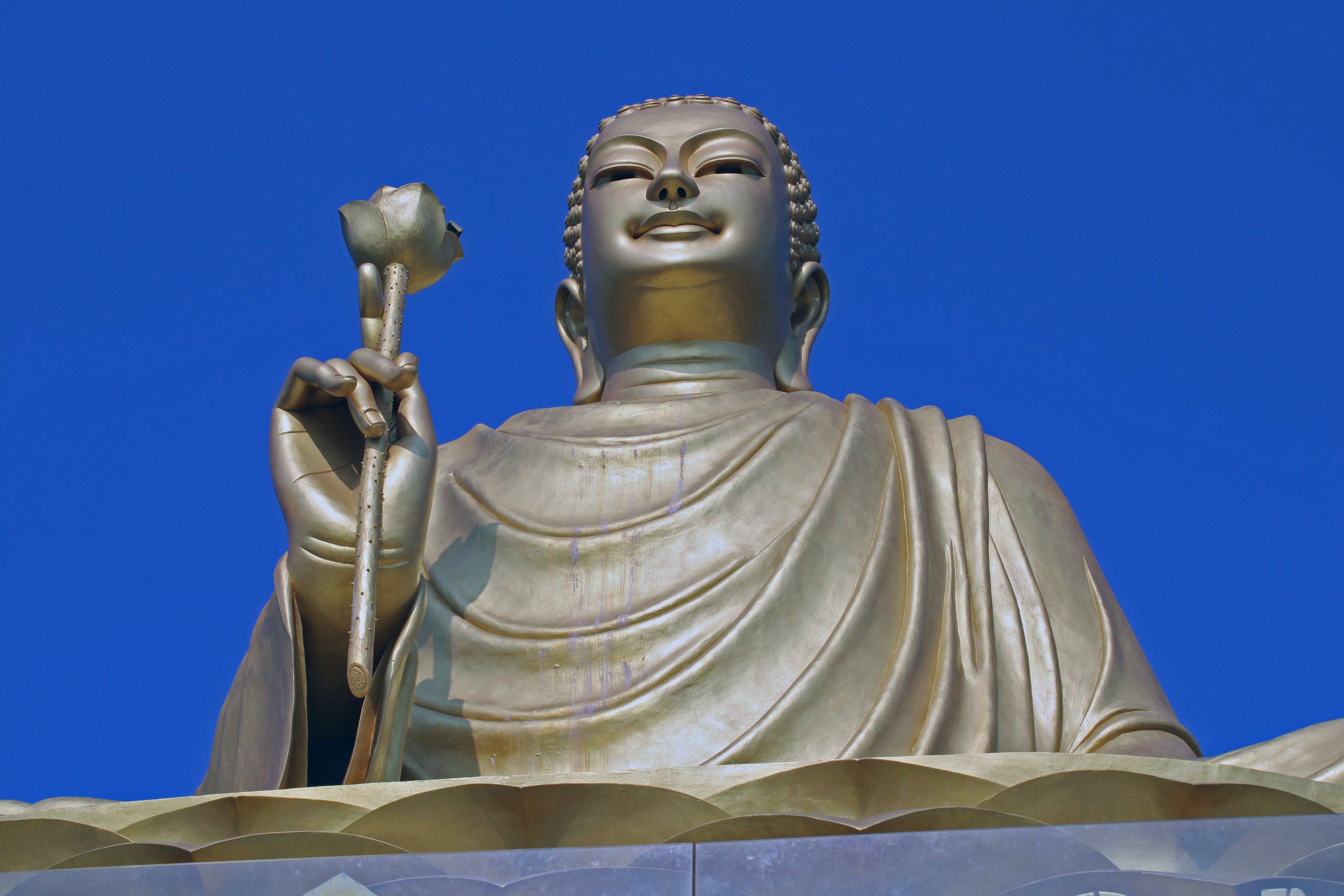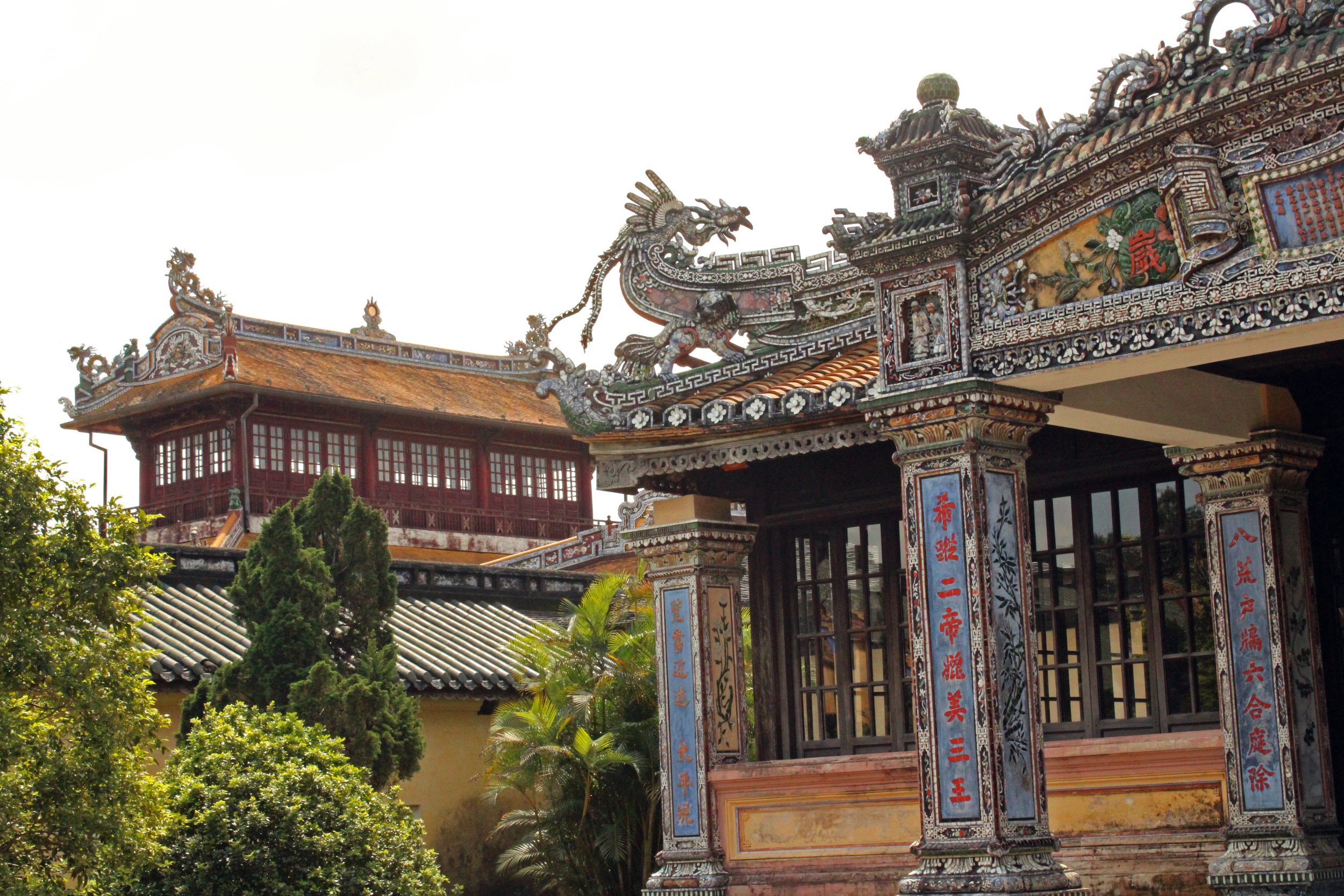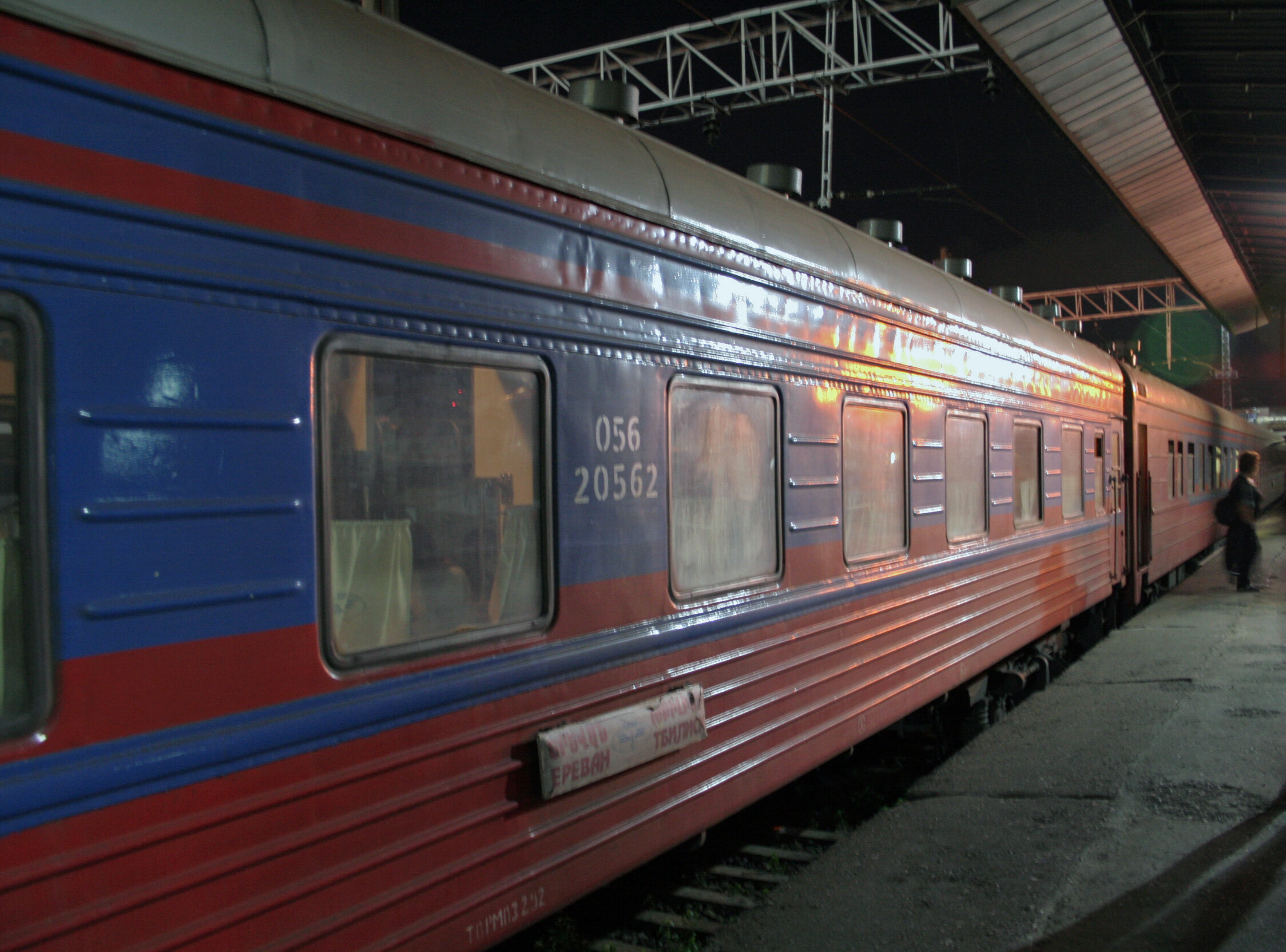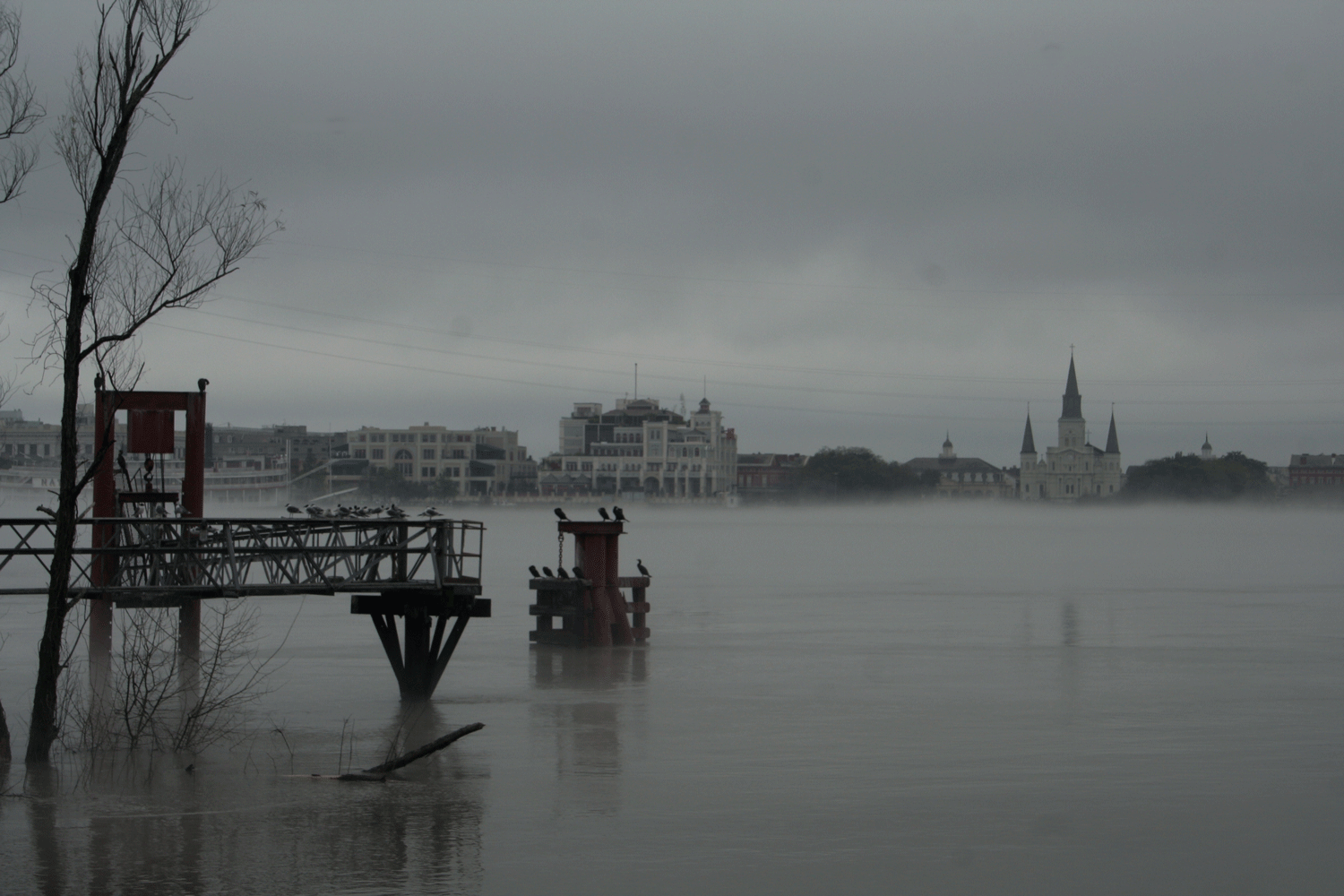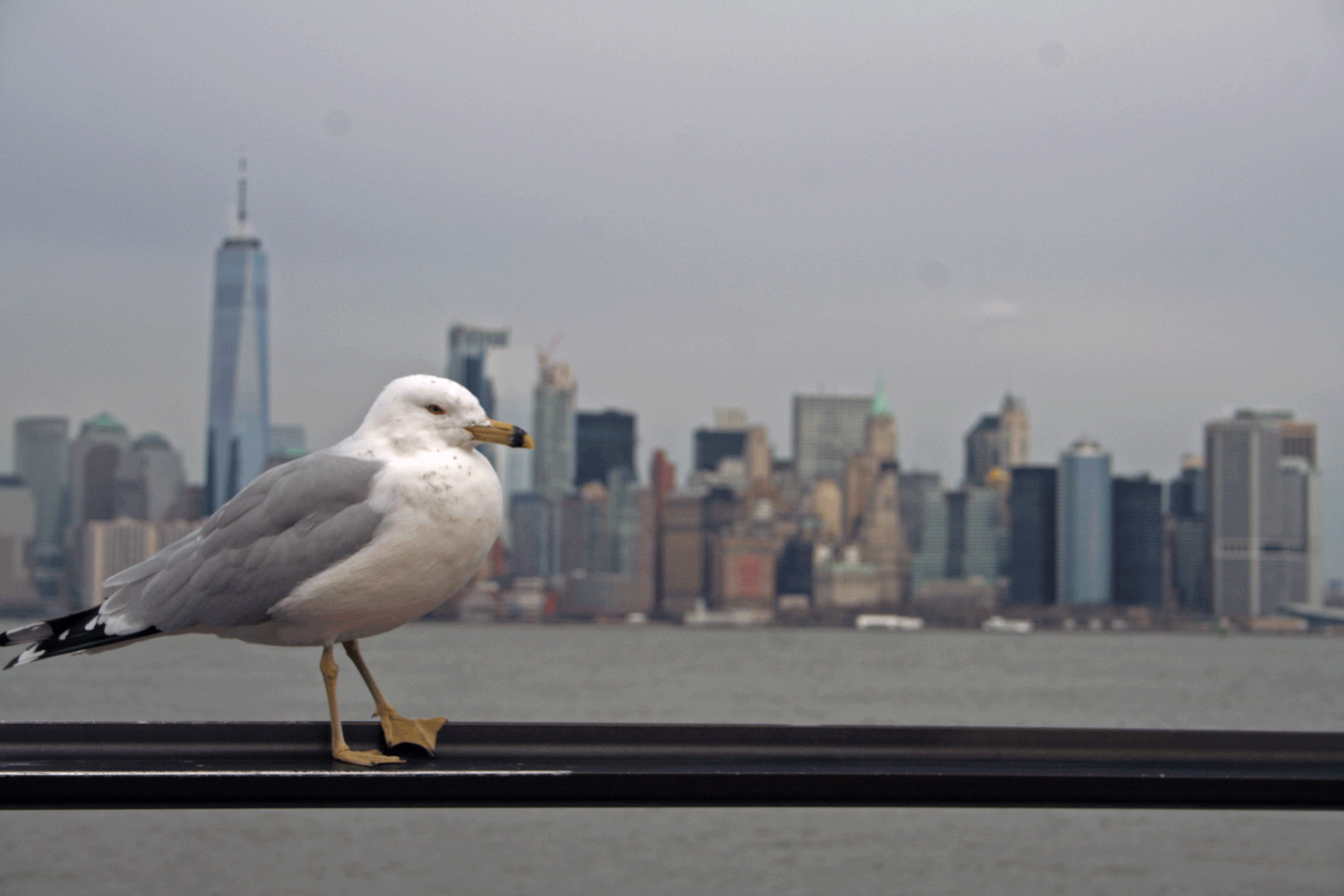Vung Tau – Day 22
Vung Tau was off on another tangent – a pleasant seaside town with a different vibe. The peninsula is divided into two distinct areas – my side attracted locals and tourists while the other catered for well-heeled Saigon weekenders. Most of the Vietnamese here were consumers like myself – in contrast to those serving tourists on the Mui Ne strip. As such, foreigners were something of an inconvenience for the hard work presented by our mutual misunderstandings. No sign of the backpacker crowd existed on the streets, beach or, packed seaside restaurants – for once the international set were my seniors rather than a generation younger, but I was yet to stumble across their nocturnal lairs.
I had checked in to the one budget place advertised locally, a family-run hotel where all the staff treated me royally. I’d inquired about a map and was brought one along with a plate of tropical fruit (including a dragon fruit) and my first sight of a knife as a utensil. The young man that brought it promised to help me ‘in any way’. In a week, we’d have been blood brothers. Even here, I don’t recall meeting any other tourists let alone one carrying a copy of the Lonely Planet. I rather liked that. A few Vietnamese seemed to be living on the floors below but we never came face to face. I had a view of a giant Buddha from my private balcony – his rival Jesus (slightly larger than his celestial cousin in Rio) lurked nearby.
To reach my hotel, I’d wisely accepted the offer of a man who’d possibly been driving the bus from Mui Ne. He saw me dawdling about the bus station without a home to go to while squinting at my guidebook map. He spoke to me via his phone. ‘I have two flying motors,’ it explained, before adding as an afterthought ‘I don’t eat eyes.’ I was glad and jumped aboard his moped. Aside from the grasping old man in a rickshaw in Hanoi, every ride since has been worth taking. It’s unlikely I’d have found my delightful hotel alone, or without considerable effort.
For dinner, the jeopardy was increased by the lack of an English translation on the street restaurant menu, but I lucked out with a wonderful fish and a blazing green chili sauce. An old waiter placed a spoon in my hands to avoid watching me eat rice with chopsticks any longer. I was overdressed in long strides, boots, and jacket. In London, a spring snow was settling.
I spent the morning overthinking. Old themes returned to haunt me hooking up with distant near-forgotten cousins. Emotionally, it felt like the equal and opposite response to my soaring mood of several days earlier – the anti-node to the happy node of the wavelength. For several hours, I ruminated deeply – eyeballing the looming black dog rather than evading it.
I felt forced to lunch in the shade after withering in the morning sun in the humid back streets. It had been snowing back home but it was too hot to be out today.
On a note of spiritual purity, I hiked up the many steps to the statue of Jesus after a long walk in the sun around the curve of the bay. A dozen school kids puffed past me at a canter – their quest seemingly more physical than religious. On the way home, I diverted towards a giant reclining Buddha on a pagoda that cascaded down the slopes with a series of colourful larger than life scenes recreated by scattered collections of statues. I followed it down to the foot of the front beach close to home – relieved it didn’t wind down onto the back beach on the far side of the peninsula. Before sundown, I took a moto with a cheery chap to a lighthouse – one of the few other local landmarks. Many walked but I had little desire to add another 5km to my overheated daytime jaunts. From its lofty perch, I saw the ‘other side’ where Saigon weekenders mass.
That evening, I chose a restaurant which I mistook for another I’d visited previously. The woman I thought was a waitress greeted me with a questioning hostility that suggested she wasn’t. In answer, I told her I wanted dinner, an ambition she treated with clear suspicion. She handed over a menu grudgingly, while explaining the situation to two colleagues with low cut tops. Around now, I realised that it wasn’t the place I knew and that the hostesses around me were unwilling waitresses. But the view (of the street) was fine. Beneath me in the garden, an elderly white man dined alone, while a mixed group of Vietnamese noisily caroused. Inside a couple of younger white men played pool and pondered their options. The seafood and vegetable curry was excellent despite the profit margins being higher on its other product lines. I had no extras bar the beer.
‘No boat to Saigon’, I was told at reception, so I settled for their suggestion of a luxury limousine. I didn’t need a limousine, obviously, and imagined it might be more like a luxury mobile prison. Still, for 200,000 dong, it was probably comparable in price to a bus ticket without the stress of the station babble.
But during a final walk towards the unexplored hinterland, I stumbled serendipitously upon a jetty for a hydrofoil and bought a ticket on impulse. My hosts were presumably discussing the ferries being cancelled by the strong winds. I cancelled my limo.
After yesterday’s gloomy introspection, I felt much cheerier and invigorated. I rose soon after six and was trekking to the Golden Buddha before the sun regained its spite. At the pagoda, I met a welcoming caretaker, who insisted I kept my sandals on before entering, but I removed them anyway to balance the karma of my inappropriate shorts elsewhere. Lots of dogs cheerfully barked at me in a manner both friendly and territorial. I had the place to myself and from beneath the giant golden belly, I spied the gaunt grey profile of Jesus atop a distant hill.
From there, I went to my new local breakfast place – the one that looks like a hostess bar (but isn’t) for eggs benedict. I was trending towards luxury European food. On the way, I waved cheerily towards its doppelganger where several of the ladies reciprocated with a warm salute. I shaded out the midday heat at the hotel where I worked on my radio pieces.
For all its ambivalent reputation, I felt more relaxed here than anywhere else in the country. Mui Ne offered luxury in solitude or international partying during another season. The sensory overload of the polluted big cities drove me out and in Dalat I’d neglected to spend more time in the beauty spots beyond the city limits. Hoi An was seductive in all it offered but its purpose revolved around commerce and was no place to dawdle. It was strange to feel this way here as I had little to offer the inhabitants. I didn’t encounter grizzled ageing barflies looking for cheap young women and booze though I wandered past most of these shadowy cloistered haunts, while the natives had jobs and lives that required no foreign sponsorship. Perhaps the lack of backpackers made me more relaxed.
At sunset, I paddled in the sea amid warmly smiling locals.
For dinner, I treated myself to Bistro 9, the recommended French restaurant. It was my last night, after all, and I’d have been disappointed going anywhere else. I vaguely recall a cocktail, wine, and a risotto, and using all the bread in the basket to mop up the sauce. It’s not so far from my younger self stocking up on the menu de la jour in a Parisian brasserie, but while my budget hasn’t dramatically risen in the intervening decades, I’m happy – with better credit – to be repeating many of the experiences.
Several of the waiting staff enthusiastically helped me with my Vietnamese. Though we shared an alphabet, it was fascinating to hear how much difference could be conjured from it. I amused them. It was worth the floundering effort for this response alone. One waitress was sad I came alone despite reassurances of my contentment. I exchanged a few friendly words with the French chef, but didn’t join the conversation of the wrinkling sun-bleached European ex-pats idling the evening away on subjects of international business. They were my culture and generation, but I preferred to bond with the happy youngsters. A gulf lay between these white chiefs and the Vietnamese, and I felt only enthusiasm for the latter. I had no idea what my peers made of my happy chirruping.
Saigon – Day 25
The hydrofoil terminal lacked a waiting room, visible staff, or form of communication. Hence the air of confusion amongst the milling passengers seeking clues about the journey. At departure time, we emerged tentatively from our random corners – such as the convenient but seemingly unattached adjoining restaurant where I had a coffee – and congregated on the jetty alongside our presumed boat. Beyond a cursory glance at our tickets, we were ushered on without further ado and were soon skimming fast and high over the water.
In the air-conditioned cabin, endless episodes of a candid camera show were broadcast, while a solitary child made a lot of noise with a tablet computer which only his parents failed to hear. Belatedly, I went outside to observe the heavily forested landscape fly by.
The mode of transport and the setting was reminiscent of the war films that introduced the idea of the country to me – scenery I’d only really seen first-hand when I’d bussed down to the coast a week earlier. The US poisoned 4.5 million acres of jungle in the war – so much of the verdant landscape I had imagined was no longer here. While the signs of industry grew as we closed in on the city, the landscape was still largely free of cultivation or humanity.
Our entrance was relatively sudden and spectacular – a phalanx of gleaming skyscrapers announced a metropolis that would grace a sci-fi movie – no tedious warnings of its arrival through slow-building suburbs. I took a moto taxi to the most obviously budget tourist area – a cheap 20-minute ride that might’ve taken me a day to find alone. It wasn’t very prepossessing. The pollution and frenzied riding of mopeds rivalled Hanoi, but the heat added to a sense of oppression that had a distinctly Western feel. Elsewhere, a liberalised free market may have been operating openly alongside a low key authoritarian regime, but rampant capitalism was in the ascendency here in all its charmless unfettered glory.
Saigon 1830…
I’d always wanted to say that… in a croaky world-weary voice.
I drank a cooling beer in a narrow lane of cafés and restaurants close to my hotel after a day in the polluted swelter of the nation’s largest city. Within the fug of the endless battalions of scooters, I’d followed the clusters of tourist sights on my city centre map.
On the road in front of the opera house, I met a singular French cinematographer dicing with death. We briefly bonded. She showed me her quirky cameras, one was a 100-years-old, and a second a few decades more. And then she was gone… and somewhere in the Mekong Delta within the day. I was back in the first of several busy cities: Saigon, Dubai, and London. And unsure if I was ready. The traffic was as mad as Hanoi, but perhaps demanded a different flavour of confidence or mind game to safely cross the street. It was wilder, cheekier, and more sensual – more people called out, motives were less clear; it was messier, poorer, and probably more dangerous.
My hotel required a 2.5 million dong deposit, which exceeded the total for my likely bill – 700,000 dong a night was nearly double the highest I’d paid, but was still only £25 and came with air-con, bathroom, and a superfluous TV as well as kettle and assorted useful extras such as nail clippers, razor and shaving foam! All items failing my stringent inventory test. My long nails and resurgent stubble all demanded attention from these luxurious single purpose tools. Breakfast was also included but proved a damp (hot) squid as I’d lost my yen for bowls of steaming soup first thing. But unlimited coffee and condensed milk was a bonus for all the havoc it might wreak on my cholesterol levels.
For dinner, I ordered from a menu of too many choices (and cuisines) in a relatively quiet alleyway close to home. Less than 100m away was one of the world’s noisiest and brightest streets, which had violently assaulted my senses a little earlier. It was lined with podium dancers gyrating like sirens outside competing clubs, barely pubescent masseurs, and boisterous ‘security’ men-children who looked to ‘accidentally’ herd us into their premises. Stunned and amused tourists filled the low street-side tables. It wasn’t a place to stop alone – just walking its length once threatened a sensory overload. A generation ago, the grandparents of today’s employees entertained GIs as part of their survival strategy to counter the latest existential threat from outside its borders. And like a sinister eastern orchid, the rooted sleaze blooms anew from the cracks in the Saigon pavements.
A smattering of police topped and tailed this massed boulevard of temptation – the only evidence of the authorities minding the wild profitable hedonism. But then a couple of pickup trucks carrying a cargo of two shame-faced and cuffed young criminals gently nudged their way through the idling masses. It felt like a performance to reassure the consumers as much as intimidate any potential criminals. Sydney Carton being led to the guillotine through the baying masses in A Tale of Two Cities sprung obliquely to mind. But he had a cause.
The previous night, I’d hung out at an outdoor sports bar with Daniel et Monique – a British-based French couple – to watch the England-France rugby in the Six Nations. We discussed the failings of modern Britain – Brexit obviously, and how the Tories were currently showcasing its Stop the Boats policy, while the BBC was banning Gary Lineker for tweeting liberal opinions. I wondered why they’d stayed so long, but their daughters were successfully melding the cultures, and it could be argued the whole world was going to pot more than it usually appears to be.
I cheerfully refused a sensual bombardment of offers in a local side street – and witnessed the delightful and beautiful young waitresses firmly handle rowdy young Brits. They would have besotted and intimidated me at 16, and were having none of my compatriots’ antics. The young revellers enjoying a stereotypically Bangkok-style Saturday night were a different breed from the earnest slightly older backpackers I’d met elsewhere. The former were perhaps school leavers, while the latter tended to be recent graduates. Or perhaps the nature and tenor of their good times was dictated by the wilder pack mentality of the all-men groupings versus the more moderated behaviour of those melding with women.
I was overcharged several times with an inflated bar bill, but not so I felt deliberately cheated. Back in the hotel, nothing quite worked as well as it was intended. The door lock and bolt, for example, required a lot of coaxing to collaborate.
Polluted crowded roads and frustrated wanderings dogged my days in Saigon. I diligently tracked down the Jade Emperor Pagoda – a ‘working’ temple and one in which I tried to avoid treading clumsily on anyone’s devotions. I was quite worn out before I arrived and needed some robustly delivered directions from a shouty local man at a nearby coffee stand to find it. He knew slightly more than my paper map and Google. The temple wasn’t as my vivid imagination created it from the lavish descriptions of the Lonely Planet nor was the Binh Tay Chinese market in Cholom, which took an age to walk to in the afternoon sun (I almost turned back). It was packing up when I arrived.
I reminded myself that I rarely visit churches or markets at home unless by express appointment or for practical purpose. I’m not sure what the market offered me anyway though I briefly bargained for a set of soup bowls. They were reminiscent of some we’d bought in the Far East half a century ago and collectively the family was down to its last few. My counter-offer was greeted with a snort of contempt. I walked. Compared with the time-consuming high-hysteria of the Maghreb, it was a refreshingly brief and decisive interaction.
For me, the tourist high spot was the War Remnants Museum, the exterior of which was rammed with ordnance and machinery of destruction. Ample information was clearly provided – in the languages of the oppressor and the victim – on the consequences of this last and most devastating of invasions. It was strange how most visitors to Vietnam hailed from past invaders whether Chinese, American, French or Korean. The friendly natives let the monuments and museums make their case. A clear presentation of the facts is enough. I overheard a senior woman from the US saying: ‘if it’s meant to be about Vietnam, why is there so much American stuff?’ Meanwhile, a 60-something American stormed around the war crimes section in an apoplectic rage. He might have been shamefully digesting the evils of his country’s foreign policy, but I suspect his outrage concerned them being highlighted.
So, this is the end… nearly.
Early evening on my last night in Saigon, and I was sat people-watching in my local alley café with a strawberry smoothie. To round off my touristic experience, I’d considered a cocktail atop one of the downtown high-rise drinking spots, but was happy where I was and couldn’t be bothered to go alone.
Earlier, I’d visited the Cu Chi tunnels and crawled 100m through one widened for western girths. It narrowed sufficiently midway to force me to crawl on my hands and knees. Someone asked if I needed a hand with my bag through the tunnel, which I politely refused having forgotten my relative age amongst the fresh-faced youth. A skittishly friendly woman of my age revealed how her trip was a response to a mid-life crisis provoked by her son leaving home. She spoke compulsively with everyone about it and mentioned being the oldest in the group several times. Getting stuck lowering herself into a tunnel did nothing for her nerves.
Talking of nerves, some paid to fire semi-automatic rifles. Their ear-splitting cracks made it easy to imagine 100 shots ringing out suddenly in the dead of night. Each one representing a bullet with your name on it or an unseen phantom trying to kill you. For months on end. A friendly young Englishman asked why I didn’t try it. Maybe he just saw a gun range. He suspected, perhaps, that I had ethical reasons for not firing them, but couldn’t quite put his trigger finger on it. I was feeling a little sanctimonious, but might easily have fired one on another day.
Our guide tested us on the dates of the conflict. For the mainly youthful audience, it was random guesswork. One plumped for 1996 – perhaps representing his dim, distant past. To be fair, the long roots of the conflict grew quietly underground before blooming in inglorious technicolour. So, it’s hard to pin down the exact timing. But he was still three decades out.
Some of the older Western men – ex-forces, I’d guess – were clearly there to gratify their inner Neanderthal. Corrupted, perhaps, rather than insightfully cleansed by the evil they’d witnessed. It was as if their prior knowledge – being part of an invading force, willingly or not – had given them ideas for what could be bought cheaply. Low prices – particularly for women – seems high on that list. But others, I imagined, were seeking to process these past unprocessed horrors. Over several evenings at the smoothie stand, I’d spied a serious but gentle-looking North American of a certain age sitting across the way – I was intrigued by the potential stories behind some visits. He was polite and friendly with those he spoke with but there was something withheld – a very un-American trait – in his manner as he thoughtfully supped his juice. Intuitively, I guessed he was on a redemptive mission rather than a holiday. Before I could find an excuse to make an oblique approach to gently mine his memories, he was gone. For reasons of self-preservation, I suspected the floodgates would not easily yield. Or that again my imagination was getting carried away with itself.
Meanwhile, a skit of a lass danced around a grizzled European – she was doing all the work, and likely well paid (or perhaps he was just reticent about showing his emotions!) Across the way, a French-looking couple of middling years gazed on – muttering knowing commentary as the mismatched couple passed. A spectacular young woman sashayed by – the age of my unborn daughter. Mopeds idled along beside us bedecked with salted fish.
Later, in the wonderfully comprehensive indoor market, I found myself the right dressing gown. It sent the wrong one clearly in a Sarah-wards direction. The woman who sold me the original had looked dubious – torn between the sale and telling me it was clearly designed for a woman. The next day I returned and bought a colourful lacquered box and a slender statuette of a woman created from egg-shells. I’d intended to buy from Stall 38 to honour a promise, but the lady had vanished somewhere into the labyrinth.
Day 28
I visited the Botanical Gardens, which might make a peaceful haunt in a longer stay, but the incarceration of the big cats and bears in small pens reflected an absence of empathy more than a preservation of the species. No better illustration than the middle-aged woman lobbing sticks to disturb a listless bear with a look of smug amusement.
More edifying was a stroll around the Reunification Palace. Due to its 1970’s hotel exterior, it looked better on the inside, albeit a look – the in-house documentary assured me – that was modelled on various harmonious eastern principles. Aside from a few spectacular vases, the theme of absent content prevailed. Instead, you had to imagine the messy history that once filled it. I enjoyed best the control rooms in the basement with the clunky metal cabinets of knobs and flashing lights employed to vainly make sense of the military madness sparking about the country. Dirty tissues, crisp packets and ripped paper of the period would’ve added richly to the atmosphere for all the havoc it would play with the Feng Shui.
Skipping the adjacent history museum was the right decision due to my impending 1400 checkout. This was made harder by a disastrous and unnecessary ‘short-cut’ that doubled the journey. The traffic, of course, punishes such mistakes by breaking up the rhythm and flow of movement. Only when I turned to see the guiding skyscrapers on the wrong side of the city did I realise I’d overshot. I had just enough time to douse myself in lukewarm water (too cold this morning, too warm now) and throw my gently fuming clothes (along with the pristine untouched silks) into my turgidly swollen rucksack.
Earlier, I’d bumped into a man from the tunnel trip looking existentially lost with a beer. He detailed his unhappy divorce (1.5 houses lost, $160k on lawyers) and the ambitious, instinctive, and possibly endless world tour he was conducting with fear and wide-eyed naivety. He was open to advice on everything.
He introduced me to some grizzled old hands from South Africa and Australia and implied with a nod and wink how they knew their way around town. It felt like he could only be referring to prostitutes. They were friendly, but it was the only time our paths were likely to cross. It would’ve felt awkward to spend any longer together and reveal our differences: they seemed to belong to closed members-only category of humanity from which, once entered, there would be no coming back. Compared to the idealistic gap-year travellers, they appeared to be wringing out their last ounce of youth on the local fleshpots. With cash, of course; the time for two-way sensual transactions had long passed for them. An over-simplification, no doubt with so many types and circumstances to categorise. After all, the urges of gap-year hedonists are perhaps not so different – the young ones were perhaps just discovering what the older ones knew was slipping from their grasp.
Two 7-hour flights starting from midnight were always going to be tedious, but the six hours of airport time preceding it and the three hours between stretched out the grind excessively. The promise of transport strikes back home suggested a day to write off. Just reaching my gate was an almighty faff – huge snaking queues led to check-in and security.
Dubai was a city that provoked contempt rather than fear now that I was no longer the wanted man of my paranoid fears. But it didn’t let me go gently, or without spite. I spent a lot of time wandering its vast vague halls, taking a substantial subterranean bus journey between terminals, and negotiating three intense security checks. The ten-dollar coffee and the strenuous efforts taken to find me guilty of something lowered the odious city-state yet further in my estimation.
While watching an episode of Curb Your Enthusiasm on the final flight, I blundered into a confrontation with the man seated ahead. Feeling slightly deranged with sleepless exhaustion, I responded to his second baleful glare back – both unprovoked – with a less than conciliatory: ‘What are you looking at?’ It wasn’t meant to come out like that. The confrontational tone was ironic as – unbeknown to him – I’d passed over his falling cap and pillow half a dozen times as he vainly tried to find a comfortable sleeping position. It was a very Larry David moment, and not my proudest, but I’d have been amused if someone else had said it. It was a dose of poison picked up from the emirate I’d just passed through, not the wonderful one in which I’d spent the last month.
I’d rather remember the gentleness of Far Eastern folk – like my final receptionist, one of many so eager to please. She looked touched when I asked to photograph her and became immortalised as the archetypal receptionist of Vietnam, a living symbol of those who raised my spirits and touched my heart in each temporary home. I thank Google Translate for letting us meet in the middle.



